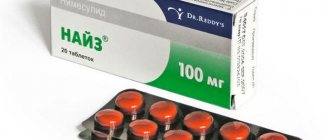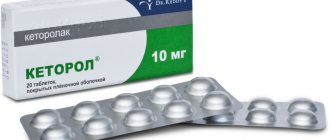One of the symptoms of a hangover is a severe headache. Painkillers help get rid of the unpleasant sensation. But not all of them relieve pain without consequences, especially against the background of drinking alcohol. Taking a number of analgesics together with alcohol can have serious health consequences.
Substances incompatible with alcohol include Ketorol, a popular drug that relieves pain and inflammation. It is classified as a strong non-steroidal analgesic. It is used in the fight against pain of various etiologies. The big advantage of the product is that it is not addictive - there is no need to increase the dosage.
When is Ketorol used?
The scope of action of Ketorol is extensive. It helps cope with tooth, muscle and joint pain. It is recommended to use it for sprains, joint injuries, radiculitis, migraines, and after surgery. The product is even used to relieve pain in patients with cancer.
The ketorol tablet begins to act after 10 minutes. The product completely relieves pain in a little more than half an hour. An analgesic injection works even faster: the effect is achieved in less than 10 minutes. The medicine lasts for about 5-6 hours. The product is also sold in the form of a gel or ointment for topical use, that is, applied to the surface of the skin.
The potency of Ketorol is almost similar to Morphine. Along with pain relief, the product also has a good anti-inflammatory effect, but it does not cope well with fever.
A distinctive feature of the drug is its high bioavailability. Once in the body, the product is quickly absorbed. Metabolism occurs in the liver, and excretion occurs mainly due to the work of the kidneys.
Instructions for use KETOROL INSTA
Prescription for patients with impaired liver function
:
- prescribed with caution. While taking ketorolac, liver enzyme levels may increase. If there are functional abnormalities in the liver while taking ketorolac, a more severe pathology may develop. If signs of liver pathology are detected, treatment should be stopped.
Patients with renal failure or a history of kidney disease
:
- ketorolac is prescribed with caution.
Food
:
- reduces the rate, but does not affect the volume of absorption of ketorolac.
Impact on laboratory test results
:
- it is possible to increase bleeding time when studying coagulation parameters.
Since a significant proportion of patients who are prescribed ketorolac develop side effects from the central nervous system (drowsiness, dizziness, headache), it is recommended to avoid performing work that requires increased attention and quick reaction.
Children
Not used in children
Risk during childbirth:
- may adversely affect fetal circulation and suppress uterine contractions.
Impact on the ability to drive vehicles and operate machinery
:
- During the treatment period, care must be taken when driving vehicles and engaging in other potentially hazardous activities that require increased concentration and speed of psychomotor reactions.
Precautionary measures
The maximum duration of use, including the use of parenteral forms, should not exceed 5 days
.
Gastrointestinal bleeding, ulceration and perforation
.
Gastrointestinal bleeding, ulceration or perforation, which may be fatal, has been reported with the use of NSAIDs at any time from the start of treatment. Such bleeding can develop with or without warning symptoms or in the case of severe disorders of the digestive tract in the anamnesis. The risk of severe gastrointestinal bleeding depends on the dosage of the drug. This, in particular, applies to elderly patients who use ketorolac in an average daily dose above 60 mg. For these patients, as well as for patients who are concomitantly using low doses of acetylsalicylic acid or other drugs that may increase gastrointestinal risk, combination treatment with protective agents (eg, misoprostol or proton pump inhibitors) should be considered. Ketorol Insta should be used with caution in patients receiving concurrent medications that may increase the risk of ulceration or bleeding, such as oral corticosteroids, selective serotonin reuptake inhibitors, or antiplatelet agents such as acetylsalicylic acid. If gastrointestinal bleeding or ulceration occurs in patients receiving Ketorol Insta, the course of treatment should be discontinued.
Respiratory dysfunction.
Caution is required when using the drug in patients with bronchial asthma (or with a history of asthma), since NSAIDs have been reported to accelerate the onset of bronchospasm in such patients.
Influence on the kidneys
.
Prostaglandin biosynthesis inhibitors (including NSAIDs) have been reported to have nephrotoxic effects. The drug should be prescribed with caution to patients with impaired renal, cardiac, or liver function, since the use of NSAIDs may lead to deterioration of renal function. Patients with mildly impaired renal function are prescribed lower doses of ketorolac (those that do not exceed 60 mg per day intramuscularly or intravenously), and the renal condition of such patients should be carefully monitored. As with other drugs that inhibit prostaglandin synthesis, increases in serum urea, creatinine, and potassium have been reported during use of ketorolac tromethamine, which may occur after a single dose.
Cardiovascular, renal and liver disorders
.
The drug should be used with caution in patients with conditions that lead to a decrease in blood volume and/or renal blood flow, when renal prostaglandins play a supporting role in ensuring renal perfusion. In these patients, renal function should be monitored. The volume reduction should be corrected and serum urea and creatinine levels and the volume of urine excreted carefully monitored until the patient becomes normovolemic. In patients on renal dialysis, the clearance of ketorolac was reduced by approximately half the normal rate, and the terminal half-life was approximately tripled. Patients with impaired liver function due to cirrhosis did not have any clinically significant changes in ketorolac clearance or terminal half-life. Borderline increases in one or more liver function tests may occur. These abnormalities may be temporary, may remain unchanged, or may progress with continued treatment. If clinical signs and symptoms indicate the development of liver disease or if systemic manifestations are observed, Ketorol Insta should be discontinued.
Fluid retention and swelling
Fluid retention and edema have been reported during use of ketoroalc and should be used with caution in patients with cardiac decompensation, hypertension, or similar conditions.
Cardiovascular and cerebrovascular effects
.
There is currently insufficient information to assess such a risk for ketorolac tromethamine. Patients with uncontrolled hypertension, congestive heart failure, diagnosed coronary artery disease, peripheral arterial disease and/or cerebrovascular disease should be under medical supervision.
Systemic lupus erythematosus and mixed connective tissue diseases
.
In patients with systemic lupus erythematosus and various mixed connective tissue diseases, the risk of developing aseptic meningitis increases.
Dermatological
.
Ketorol Insta should be discontinued at the first signs of a skin rash, damage to the mucous membranes or any other signs of hypersensitivity.
Anaphylactic (anaphylactoid) reactions
.
As with the use of other NSAIDs, anaphylactic (anaphylactoid) reactions (including anaphylaxis, bronchospasm, flushing, rash, hypotension, laryngeal edema, Quincke's edema) may occur in patients who have no or no history of hypersensitivity to aspirin, other NSAIDs or ketorolac. This set of symptoms may also occur in individuals with a history of bronchospastic reactivity (eg, asthma) and nasal polyps. Anaphylactoid reactions, such as anaphylaxis, can be fatal. Therefore, ketorolac should not be taken by patients with a history of asthma, and by patients with complete or partial nasal polyp syndrome, angioedema and bronchospasm. If anaphylactoid reactions occur, seek emergency medical attention.
Hematological effects
.
Patients with bleeding disorders should not be prescribed Ketorol Insta. Patients receiving anticoagulant therapy may have an increased risk of bleeding if ketorolac is used concomitantly. Patients receiving other drugs that may affect the rate of bleeding control should be carefully monitored when ketorolac is prescribed to them. In controlled clinical trials, the incidence of significant postoperative bleeding was less than 1%. Ketorolac inhibits platelet aggregation and prolongs bleeding time. In patients with normal bleeding times, the duration of bleeding increased, but did not exceed the normal range of 2-11 minutes. In contrast to the long-term effects resulting from the use of acetylsalicylic acid, platelet function returns to normal within 24-48 hours after discontinuation of ketorolac. Ketorolac should not be prescribed to patients who have undergone surgery with a high risk of bleeding or incomplete control of bleeding. Caution should be used if mandatory bleeding control is critical. Ketorol Insta is not an anesthetic and does not have sedative or anxiolytic properties; therefore, it is not recommended as a premedication before surgery to maintain anesthesia.
Contraindications
The analgesic is a potent drug and has a number of contraindications. It is not recommended for use by women during pregnancy and breastfeeding, children under 16 years of age, as well as people with diseases of the stomach and intestines (in the form of erosions or ulcers). Contraindications also include:
- tendency to bleeding and bronchospasms;
- liver and kidney failure;
- post-infarction and post-stroke condition.
The list of contraindications specified in the annotation for the pharmaceutical product includes the presence of factors that increase the toxic effect of the drug on the gastrointestinal tract. One of these factors is alcohol. That is, this point of the instructions can be deciphered as follows: the combination of Ketorol with alcohol turns the drug into a substance toxic to the body. Taking painkillers together with an alcoholic drink can cause serious health problems.
How does the combination of ketorol with alcohol affect the gastrointestinal tract?
Ketorol, even without alcohol, is unsafe for the gastrointestinal tract - it causes inflammatory processes on its walls. If you also add alcohol, then cracks and ulcers may form on the gastrointestinal mucosa, and colitis, gastritis and other chronic diseases of the intestines and stomach will begin to appear.
If a person already has erosive gastritis or peptic ulcer disease, then the combination of alcohol and ketorol can cause dangerous internal bleeding and exacerbation of these chronic diseases.
Remember! It is especially undesirable to use this combination if a person suffers from a peptic ulcer. It is unwise to mix strong drinks and any ketorol. Injections and alcohol are incompatible in the same way as drug tablets.
What is the incompatibility of Ketorol and alcohol?
Like many medications, Ketorol has a number of side effects. Failure as a result of improper use of an analgesic can occur in any of the body systems: respiratory, urinary, cardiovascular, digestive, and also in the hematopoietic system. Alcohol can easily provoke or intensify side effects:
- The pain may not go away, but only get worse.
- Acute kidney inflammation and hepatitis may develop.
- Pancreatitis may worsen or internal bleeding may occur that is difficult to stop.
Also, the list of side effects from the joint intake of alcoholic beverages and Ketorol includes pulmonary edema and a severe allergic reaction.
During alcohol intoxication, the liver, intestines, and kidneys experience enormous stress. They process, break down and remove substances toxic to the human body. An analgesic taken to relieve pain doubles the load on internal organs. The liver begins to work not only to neutralize and eliminate ethanol, but also to break down the active substance Ketorol. Due to overload, liver cells die and a state of failure occurs.
The cardiovascular system suffers from additional stress. A mixture of alcohol and painkillers leads to spasm of blood vessels and arteries, which in turn increases blood pressure. An overloaded myocardium needs a lot of oxygen. The risk of developing ischemia—a local decrease in blood flow—increases.
Ethanol mixed with a pharmaceutical agent causes disturbances in the qualitative composition of the blood, as a result of which its coagulability decreases. This condition is very dangerous when internal bleeding or stroke occurs.
The combination of Ketorol and alcohol causes internal organs to more actively absorb incoming substances. Pain relief occurs faster, however, the effect of the analgesic is reduced significantly. When taking the medicine again, there is a risk of overdose and severe side effects: dizziness, nausea, vomiting, kidney problems.
Why are alcohol and ketorol incompatible?
Taking the drug and alcohol together sharply reduces the time during which the analgesic effect is observed. At the same time, ethanol noticeably accelerates the absorption of ketorol, and the effect of the drug occurs three times faster - within 7-10 minutes. However, due to alcohol, the pain-relieving effect subsides much faster. Therefore, the patient has to take ketorol more often and in larger doses. And this is fraught with serious complications (including kidney failure) and unpleasant side effects, such as long-lasting nausea, indigestion and diarrhea, severe dizziness and fainting, porphyria.
It is important to remember how long after you can drink alcohol after ketorol. It is highly not recommended to do this earlier than 24-36 hours after the last time you took the drug.
When is the combination of alcohol and analgesic strictly prohibited?
A mixture of alcohol and analgesics is especially dangerous for people with chronic diseases. If there are serious problems in the functioning of the liver and kidneys, the combined use of these substances that do not combine with each other can even result in death. The use of alcoholic beverages together with Ketorol is strictly prohibited for:
- autoimmune pathologies (lupus erythematosus, polymyositis, rheumatoid arthritis, Graves' disease);
- swelling;
- pancreatitis;
- the presence of malignant and benign neoplasms;
- hemorrhagic diathesis;
- heart failure.
The drug is also contraindicated in cases of chronic alcoholism.
In what other cases is the combination of alcohol and ketorol especially undesirable?
Taking the drug with alcoholic beverages is especially harmful if a person suffers from serious chronic kidney and liver diseases (hepatitis, renal failure, liver enlargement (hepatomegaly), cirrhosis).
Remember! Alcohol with large doses of ketorol can cause temporary renal failure even in a person who does not suffer from this disease.
It is also strictly forbidden to take ketorol with alcohol:
- people suffering from various autoimmune and chronic diseases, including lupus, bronchial asthma;
- persons with pronounced swelling (especially if the person has angioedema of the angioedema type);
- people suffering from pancreatitis. Ketorol and alcohol, whose compatibility is negative, can cause a very dangerous acute form of pancreatitis;
- cancer patients (including patients with benign tumors of internal organs). Ketorol and alcohol are especially dangerous for those undergoing chemotherapy and radiation therapy;
- patients with hemorrhagic diathesis;
- persons with chronic heart failure. Taking ketorol and alcohol can result in a heart attack for them;
- women during the menstrual cycle;
- after surgical operations on various organs (especially if these are organs of the gastrointestinal tract);
- women expecting a child or who have recently given birth, nursing mothers.
It is contraindicated to drink strong drinks in combination with medicine for people who already cannot tolerate the individual components of ketorol. Without alcohol, the drug causes an allergic reaction (usually mild, in the form of a rash). If you also drink alcohol, the allergy can be very severe, causing breathing problems, severe pain, and leading to disruption of the functioning of internal organs.
It is strictly prohibited to combine ketorol injections, tablets with alcohol for children and adolescents (who are under 18 years of age).
How long after can you take Ketorol before and after drinking alcohol?
Ketorol is completely eliminated from the body 10 or more hours after taking the analgesic. Moreover, in men the period of elimination of the drug is shorter than in women. So the first one can take Ketorol 18 hours before drinking alcohol, the second one can take the drug 24 hours before the expected feast.
Treating headaches due to hangover syndrome with Ketorol is contraindicated. The analgesic can be taken without increased risk to health only after alcohol has been completely eliminated from the body. Men are advised to wait about 8 hours after their last dose of alcohol, women - even longer. They will be able to take painkillers only 14 hours after consuming an alcohol-containing drink.
If Ketorol is taken in a course for a long time, then you should not drink alcohol throughout the entire treatment. Even a small amount of an alcohol-containing drink can cause poisoning or even more serious health consequences.
In case of alcoholism, the drug is used for treatment only in one case: with withdrawal syndrome, that is, the so-called “withdrawal” after giving up alcohol. For therapy, the drug is used in high doses and strictly under the supervision of a physician. Such patients are treated in drug treatment clinics.
A combination of drugs with alcohol and mental disorders. Is it possible to drink alcohol after ketorol?
The simultaneous use of ketorol and alcohol is fraught not only with physical, but also with quite serious mental problems. This combination leads to the development of clinical depression, the appearance of neuroses, panic attacks and phobias. It is also fraught with serious memory problems (up to complete amnesia).
Also, the combination of ketorol and booze causes chronic insomnia , difficulties with attention, increased fatigue and irritability. In especially severe cases (if you take very high doses of the drug and alcohol), hallucinations, delusions and other psychotic symptoms are possible.
Remember! Taking alcoholic beverages and ketorol is strictly contraindicated for persons suffering from serious chronic mental disorders (manic-depressive psychosis, schizophrenia, schizoaffective psychosis). And here's why: ethanol in combination with the drug can abruptly interrupt the period of remission and lead to an unexpected, very sharp relapse of these severe mental illnesses.
As described above, it follows that the answer to the question of whether ketorol can be taken together with alcohol is categorical: no, it is not possible. The interaction of these substances is fraught with dangerous consequences.
If your relative or close friend abuses alcohol, contact us through a request on the website or by phone, and call a narcologist to your home to help you stop drinking, the doctor will give further recommendations on the treatment of alcoholism.








